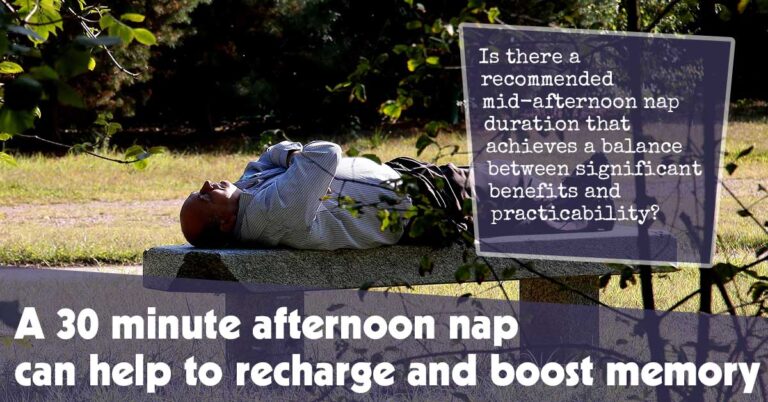A 30-Minute Afternoon Nap Can Recharge and Enhance Memory
Naps, which are short sleep periods outside of a primary nighttime period, are distinguished from unintentional sleep. Unintentional sleeping could be caused by a neurological disorder, a sleep disorders, jetlag or significantly inadequate sleep at night.
Voluntary naps on the otherhand, can be used as a planned midday refresher that can improve productivity and learning. Although the benefits of napping have been well-documented, the need to maximize workday time can make it difficult for some people to nap regularly.
Does there exist a mid-afternoon naps duration that strikes a balance between the benefits and practicality? This study provides an answer to this question. 1
32 young adults were tested on 4 separate days after a normal amount of nocturnal slumber: awake, with a 10-minute nap, 30-minute nap, and 60-minute nap.
The objective measurement of sleep time was done with polysomnography, and not just the nap time. It was possible to make a decision that was clear about how long a person should take if they took the average amount of time it takes them to fall asleep.
To compare the duration of the benefits from mid-afternoon napping, cognitive performance, subjective sleepiness and mood were assessed at intervals of 5 minutes, 30 minutes, 60 minutes and 240 minute intervals. These nap durations were also examined for their effect on memory encoding.
The average time for individuals to fall asleep was 10 to 15 minutes. All nap times between 10 and 60 minutes resulted in a noticeable improvement of alertness, subjective tiredness, and positive mood compared to being awake. These benefits lasted up to 240 minutes.
Even so, the only nap that was effective for memory encoding was the 30-minute nap. This suggests that the minimum amount of time needed to benefit memory is 30 minutes.
The benefits of speed processing were not observed. Sleep inertia – the feeling of grogginess immediately after waking up that can lead to temporary performance declines – was only observed for 30-60 minute naps. The decrements, however, were not significant and resolved within 30 mins of awakening.
A nap of 30 mins seems to be the most practical and beneficial. The recommended nap duration could be 30 minutes, with an extra 10 minutes to fall asleep.
